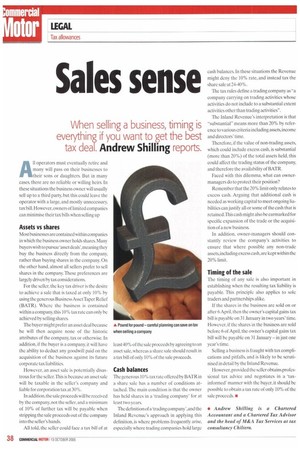Sales sense
Page 40

If you've noticed an error in this article please click here to report it so we can fix it.
When selling a business, timing is everything if you want to get the best tax deal. Andrew Shilling reports.
All operators must eventually retire and many will pass on their businesses to their sons or daughters. But in many cases, there are no reliable or willing heirs. In these situations the business owner will usually sell up to a third party, but this could leave the operator with a large, and mostly unnecessary, tax bill. However, owners of limited companies can minimise their tax bills when selling up
Assets vs shares
Most businesses are contained within companies in which the business owner holds shares. Many buyers wish to pursue'asset deals',meaning they buy the business directly from the company. rather than buying shares in the company. On the other hand, almost all sellers prefer to sell shares in the company. These preferences are largely driven by tax considerations.
For the seller, the key tax driver is the desire to achieve a sale that is taxed at only 10% by using the generous Business AssetTaper Relief (BATR). Where the business is contained within a company, this 10% tax rate can only be achieved by selling shares.
The buyer might prefer an asset deal because he will then acquire none of the historic attributes of the company, tax or otherwise. In addition, if the buyer is a company, it will have the ability to deduct any goodwill paid on the acquisition of the business against its future corporate tax liabilities.
However, an asset sale is potentially disastrous for the seller. This is because an asset sale will be taxable in the seller's company and liable for corporation tax at 30%.
In addition • the sale proceeds will be received by the company, not the seller, and a minimum of 10% of further tax will be payable when stripping the sale proceeds out of the company into the seller's hands.
All told, the seller could face a tax hill of at least 40% of the sale proceeds by agreeing to an asset sale, whereas a share sale should result in a tax bill of only 10% of the sale proceeds.
Cash balances
The generous 10% tax rate offered by BATR in a share sale has a number of conditions attached. The main condition is that the owner has held shares in a 'trading company' for at least two years.
The definition of a 'trading company', and the Inland Revenue's approach in applying this definition, is where problems frequently arise, especially where trading companies hold large cash balances. In these situations the Revenue might deny the 10% rate, and instead tax the share sale at 24-40%.
The tax rules define a trading company as -a company carrying on trading activities whose activities do not include to a substantial extent activities other than trading activities".
The Inland Revenue's interpretation is that "substantialmeans more than 20% by reference to various criteria including assets, income and directors' time.
Therefore, if the value of non-trading assets, which could include excess cash, is substantial (more than 20%) of the total assets held, this could affect the trading status of the company, and therefore the availability of BATR.
Faced with this dilemma, what can ownermanagers do to protect their position?
Remember that the 20% limit only relates to excess cash. Arguing that additional cash is needed as working capital to meet ongoing liabilities can justify all or some of the cash that is retained.This cash might also be earmarked for specific expansion of the trade or the acquisition of a new business.
In addition, owner-managers should constantly review the company's activities to ensure that where possible any non-trade assets,including excess cash, are kept within the 20% limit.
Timing of the sale
The timing of any sale is also important in establishing when the resulting tax liability is payable. This principle also applies to sole traders and partnerships alike.
If the shares in the business are sold on or after 6 April, then the owner's capital gains tax bill is payable on 31 January in two years' time. However, if the shares in the business are sold before 6 of April, the owner's capital gains tax bill will be payable on 31 January — in just one year's time.
Selling a business is fraught with tax complications and pitfalls, and is likely to he scrutinised in detail by the Inland Revenue.
However, provided the seller obtains professional tax advice and negotiates in a 'taxinformed' manner with the buyer, it should be possible to obtain a tax rate of only 10% of the sale proceeds. •












































































































































































































